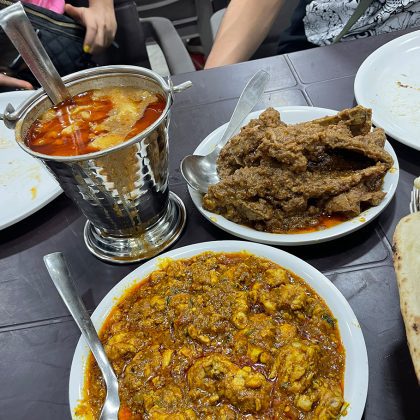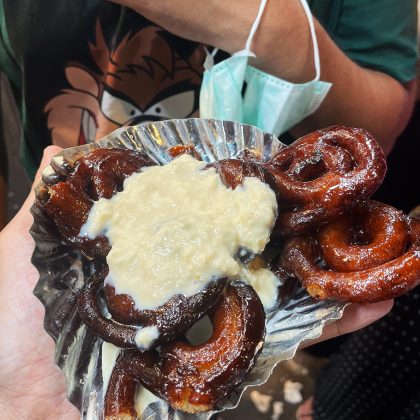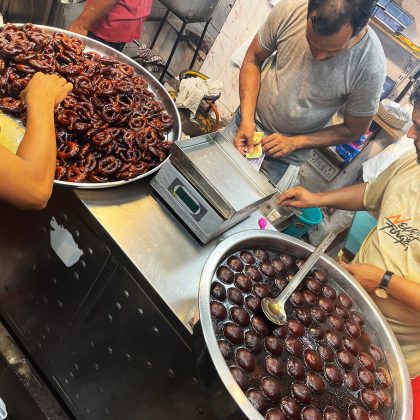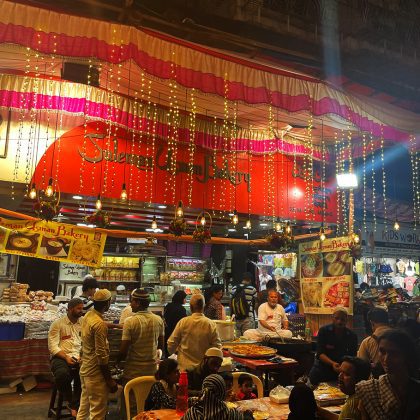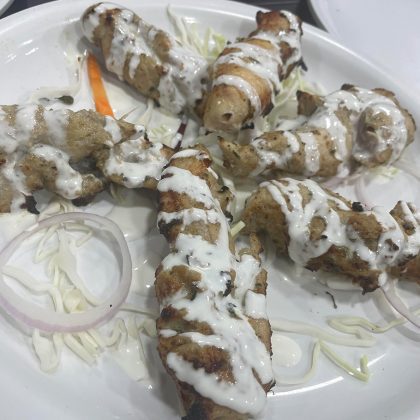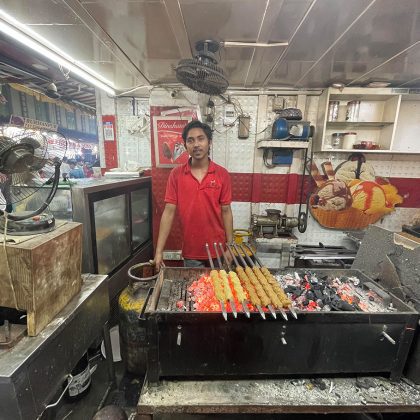
- Home
- News
- Analysis
- States
- Perspective
- Videos
- Education
- Entertainment
- Elections
- World Cup 2023
- Features
- Health
- Business
- Series
- Economy Series
- Earth Day
- Kashmir’s Frozen Turbulence
- India@75
- The legend of Ramjanmabhoomi
- Liberalisation@30
- How to tame a dragon
- Celebrating biodiversity
- Farm Matters
- 50 days of solitude
- Bringing Migrants Home
- Budget 2020
- Jharkhand Votes
- The Federal Investigates
- The Federal Impact
- Vanishing Sand
- Gandhi @ 150
- Andhra Today
- Field report
- Operation Gulmarg
- Pandemic @1 Mn in India
- The Federal Year-End
- The Zero Year
- Premium
- Science
- Brand studio
- Home
- NewsNews
- Analysis
- StatesStates
- PerspectivePerspective
- VideosVideos
- Entertainment
- ElectionsElections
- Sports
- Loading...
Sports - Features
- BusinessBusiness
- Premium
- Loading...
Premium
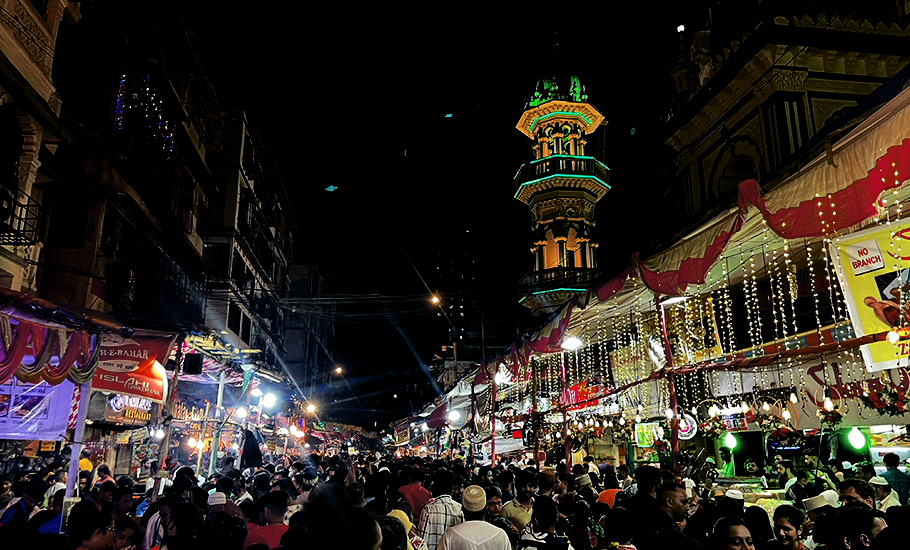
An Iftar food trail: A walk through Mumbai’s Khau Gali

For 30 nights every year, the narrow, winding lanes located around the quintessential Minara Masjid in South Mumbai take on a vibrant, nocturnal life. A little after sunset, every day during the holy month of Ramadan, the entire stretch from Bhendi Bazaar to Mohammed Ali Road descends into a familiar cacophony: it remains covered inch-to-inch with pedestrians, briefly stopping to window shop...
For 30 nights every year, the narrow, winding lanes located around the quintessential Minara Masjid in South Mumbai take on a vibrant, nocturnal life. A little after sunset, every day during the holy month of Ramadan, the entire stretch from Bhendi Bazaar to Mohammed Ali Road descends into a familiar cacophony: it remains covered inch-to-inch with pedestrians, briefly stopping to window shop at the brightly lit shops on footpaths, selling everything from bangles and spices to Eid festive wear and aromatic perfumes. But what has become both—a ritual and a bucket list nominee—is the Khau Gali (food lane) located alongside the mosque.
It is a place where one religion prevails above all others: food.
Throughout the month, eateries and restaurants that have been around here for decades, and that are open practically throughout the rest of the year but are jam-packed only during Ramadan, attract people from all walks of life, irrespective of caste or creed, to quench their craving for meaty delicacies and mouth-watering sweets. Located on the roads of these lanes are famous restaurants such as Noor Mohamaddi, Shalimar, and Suleman Usman Bakery. Eateries set up stalls and tables on the road, with celebrities and common folk alike queuing up to eat everything from platters of pathani kebabs and shawarmas, to mawa jalebis and malpuas.
This is Mumbai’s oldest, most hailed food trail, touted to be an experience that can only be lived in the skin.
For the last two years, the food lanes around the twin spots of Mohammed Ali Road and Bhendi Bazaar had been shut for business due to the coronavirus pandemic and various civic curbs that came along with it, such as indefinite lockdowns and restrictions on public movement. However, with the easing of curbs, the place is back in business—and how. On Saturday night, it was nothing less than a stampede. Sweating people walked in cramped lines along the road, in an atmosphere made more humid due to the presence of halogen lights lighting up the street. Street urchins lurked in groups under the nearby Byculla Bridge, smoking grass in small chillums made out of clay. A voice over the many mounted speakers urged parents not to leave their child’s hand while traversing through the crowd. “Social distancing ka khayal rakhe, kahin haadsa na ho jaaye.” (“Maintain social distancing, don’t let any untoward incident happen”)
Ishaan (31), a digital marketeer by profession, visited Mohammed Ali Road for the first time when he was in college. Since then, it has become somewhat of a yearly ritual for him. “These are food dishes that have their own unique recipes…,” he said, speaking with The Federal. When he arrived at the popular haunt Chinese & Grill (after making his way through what is nothing less than a stampede), famous for its threaded chicken and soft, juicy nalli nihari, the attendant taking down names at the door took a quick scanning look of him and his friends (girls among them), and handed him a plastic token similar to that used in the board game Housie. “Go ahead and take a left from the police barricade and go to the first floor of the building,” he was told.
Ishaan arrived at another door where he handed a different attendant the plastic token he was given earlier—a sign that he had “permission” to enter this gated, more private part of the restaurant. Inside, the cold blast of the air conditioning came as a relief. People were seated at tables, much like in any other restaurant. The energy inside was palpable, just like out on the street below. Just a bit more civil. A waiter arrived to take the order and made it clear that the concept of starters or the main course does not exist. The order needs to be placed once and for all. A massive order of creamy haleem, mutton nalli nihari, special mallai tikka, bheja masala, and mutton seek kebab was placed.
Such is the craze—and hype—around the food at Mohammed Ali Road. Bollywood actor Sanjay Dutt even has a dish called “Chicken Sanju Baba” named after him at Noor Mohammadi Hotel.
“For me, it’s always been about the food,” said Kashif (32), a real-estate agent by profession, who paid his yearly homage to the food Mecca last week. “My father used to eat at some of these same restaurants back when he was my age. I first came to Mohammed Ali Road with him, then with my school friends, and now, with my family (wife). You need some guts, stamina, and raw determination to visit all the iconic food spots in this area…it definitely isn’t for the faint-hearted. But if indulging in gastronomic activities is your hobby, this is one food trail that everyone should experience. I don’t think I know a single person in Mumbai who hasn’t ever visited Mohammed Ali Road during Ramzan.”
While mutton and chicken dishes, most of them heavily dipped or fried in oil, maybe the main attraction, this famous Iftaar food trail also has a cult following of its own when it comes to sweet dishes, who hail the iconic Suleman Usman Bakery as their holy grail. From fried mawa jalebis, and flavoured sherbets, to phirni/rabdi and syrupy malpuas. “Whether you’re from the press or from the minister’s office, I don’t even have a second to chat…are you seeing this crowd around you? Who will take their order?” quipped an attendant when this reporter tried asking him a few questions.

As people wade through the crowd back towards the main road in a heroic (yet failed) attempt to hail a scarce kaali-peeli taxi, they stop at some of the other smaller, less crowded sweet shops, to take a parcel back home.
All in all, there is a reason that this Khau Gali has carved its way into the hearts of Mumbaikars over the years. It is a trail that brings together people from different communities, to take part in one giant, food orgy. And although in recent times, other neighbourhoods in Mumbai’s western suburbs such as Jogeshwari and Kurla, have started gaining street credibility for being a mini version of Mohammed Ali Road, what they will not be able to provide is the larger-than-life experience that thousands of people experience in unison. During Ramadan, this food trail at Mohammed Ali Road is king.

